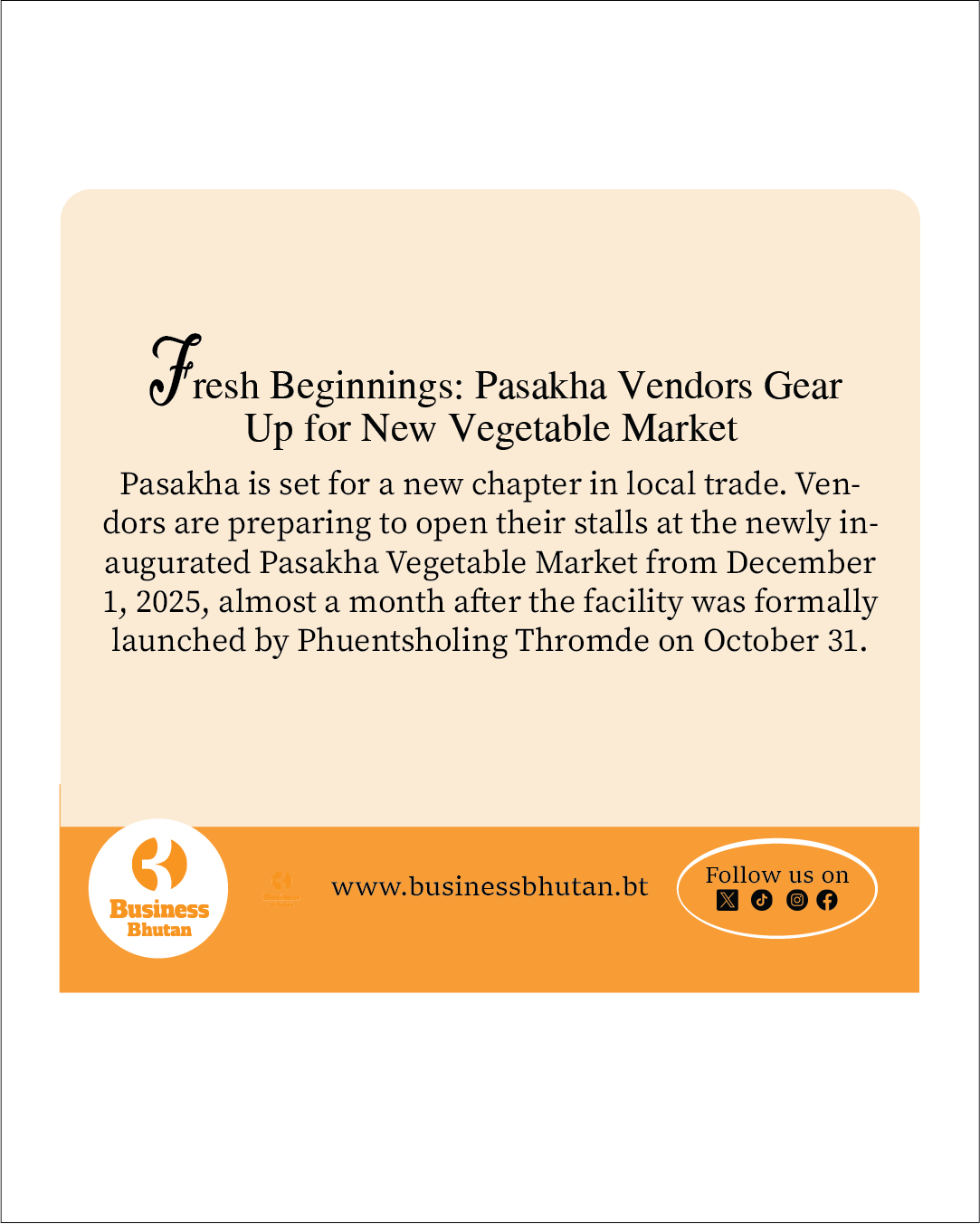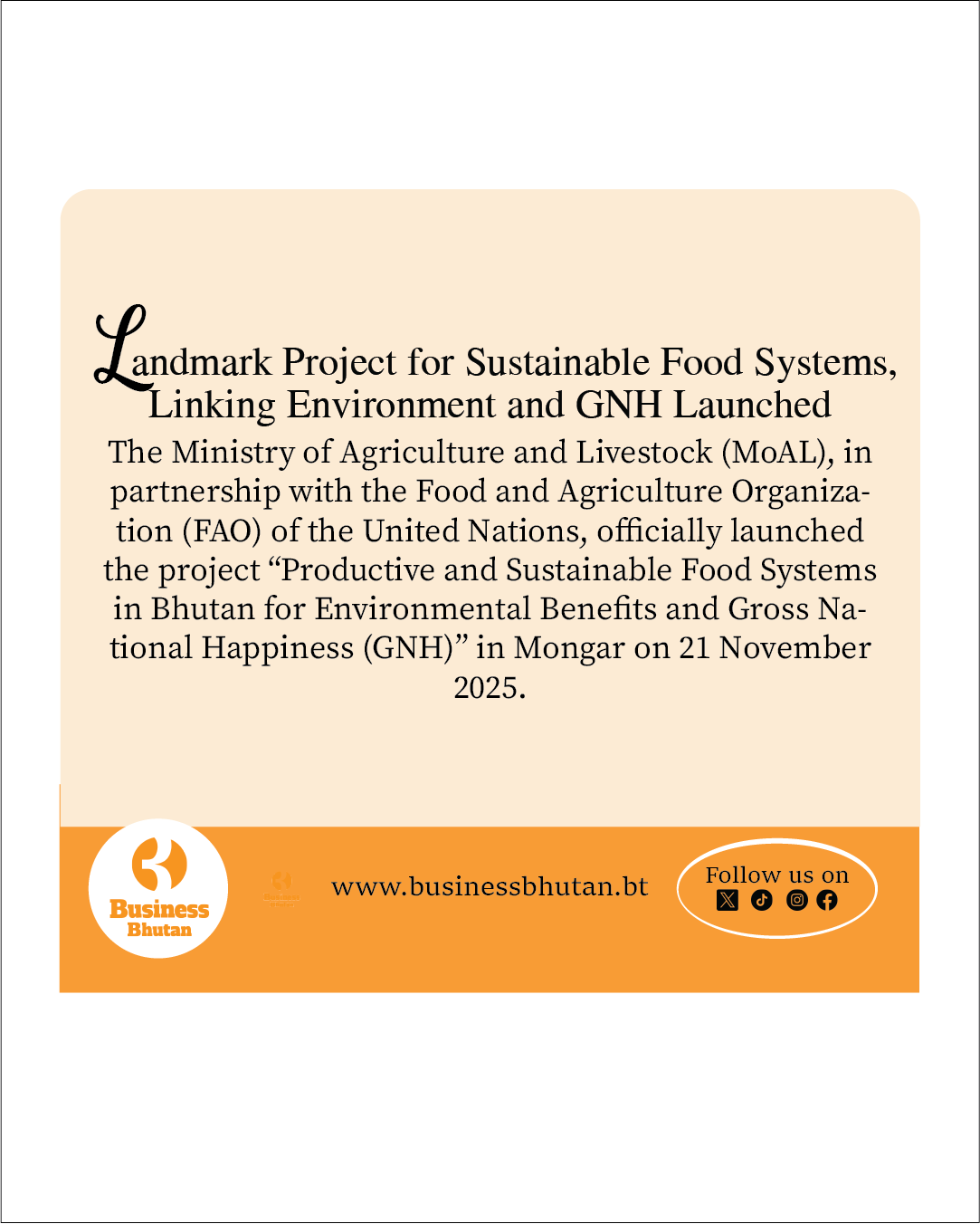After Bhutan embraced modern development in the 1960s, several institutions pivotal to achieving the noble aspirations of His Majesty the Fourth King were established following his formal coronation on June 2, 1974. Among these was the Food Corporation of Bhutan Limited (FCBL), initially established as a government agency under a Royal Charter issued by His Majesty the Fourth Druk Gyalpo, Jigme Singye Wangchuck, on August 16, 1974. Her Royal Highness Ashi Dechhen Wangmo Wangchuck, the then-representative of His Majesty in the Ministry of Development, was appointed as the Chairperson.
Yesterday (August 16, 2024), FCBL celebrated its golden jubilee, having played an immense role in the country’s development. The institution not only fulfilled its primary mandate of ensuring food sufficiency and security but also provided microcredits to farmers, established shops across the country to bring goods and essentials closer to the people, acted as a vital link between farmers and the market, and played a crucial role in eradicating goiter in Bhutan, making it an iodine deficiency disorder (IDD)-free country.
The driving force behind FCBL was the deep compassion and unwavering resolve of a King singularly committed to lifting his people from the grips of hunger and poverty. Thus, FCBL stands as a testament to how a young and charismatic King initiated sweeping reforms to establish a centralized system for procuring and distributing essential food grains, ensuring that even the most remote and desolate communities across Bhutan had access to food supplies at all times.
As mentioned earlier, the opening of the first FCBL outlets in Bhutan in the early 1970s marked a significant improvement in the availability of essential commodities. Before this, many Bhutanese had to undertake long and arduous journeys lasting weeks or even months to purchase these vital goods. The establishment of these outlets provided a much-needed solution, offering a reliable and affordable source of food commodities, fertilizers, and farm equipment.
As FCBL evolved, it established three major objectives: the distribution of essential commodities to the poor and needy, the streamlining of agricultural marketing operations to maximize benefits for producers, and the provision of credit to farmers. These initiatives not only improved rural livelihoods but also brought the entire nation’s food supply chain under the Corporation’s management. Small and marginal farmers, who made up a large proportion of the population at the time, now had a platform to trade their agricultural products and earn a decent income from their small farms. This development marked a new era in Bhutan’s pursuit of self-sufficiency and food security.
Recognizing the immense role and critical socio-economic mandates of FCBL, the government delinked the Corporation in August 1993, and it was incorporated under the Company’s Act of the Kingdom of Bhutan, 1989.
One of the earliest significant achievements of FCBL was the distribution of salt, later iodized, to various parts of the country through its agents in key trading hubs such as Phuentsholing, Sarpang, Gelephu, and Samdrup Jongkhar as early as 1975. At the time, Bhutan was grappling with a widespread public health issue known as goiter—a condition caused by iodine deficiency, leading to the swelling of the thyroid gland and the formation of large lumps on the neck. FCBL’s initiative to supply iodized salt not only alleviated the burden on Bhutanese who previously had to endure long and arduous journeys to border areas to procure salt but also played a crucial role in reducing and eventually eliminating goiter in Bhutan. This effort marked a significant milestone in the country’s public health campaign.
The earliest recorded evidence of iodine deficiency disorders in Bhutan dates back to the late 18th century. In 1783, Captain Samuel Turner, surveyor Samuel Davis, and surgeon Robert Saunders embarked on a journey from India through Bhutan and into Tibet as part of an embassy. Saunders, who was part of the Bengal Medical Service, documented his medical observations in Bhutan and later published them in the Proceedings of the Royal Society, the leading scientific journal of that time. His detailed descriptions of goiter in Bhutan became widely referenced and played a significant role in raising awareness, ultimately contributing to the efforts to eliminate the condition in the Kingdom.
A year after its establishment, on April 20, 1975, the FCBL issued an invitation for applications from interested parties to engage in the retail salt business within Bhutan. The announcement specified that FCBL would supply salt to these parties at fixed rates from base stations in Phuentsholing, Sarpang, Gelephu, and Samdrup Jongkhar. The appointed agents were responsible for transporting the salt from these base stations to sell it in more remote areas, with agents being assigned to specific districts.
To address this issue, a salt iodization plant named Bhutan Salt Enterprise (BSE) was set up in Phuentsholing in April 1985. The plant had a production capacity of 6 tons per hour and used a standard continuous spray mixing technique to produce iodized salt at 60 parts per million (PPM). This was a groundbreaking intervention in combating iodine deficiency. Iodized salt, a staple in Bhutanese diets, was distributed through numerous FCBL outlets across the country. This distribution network, although still developing at the time, significantly expanded the reach of iodized salt and played a crucial role in addressing the prevalence of iodine deficiency disorders in Bhutan. In 1982, it was decided that the FCBL would serve as the exclusive agency for importing common salt for a new iodization plant and also act as the sole supplier through its various depots and commission agents. To ensure the plant’s commercial viability, FCBL requested the Government of India to increase the salt quota from 4,000 MT to 6,000 MT.
The iodized salt plant was established in Phuentsholing, with the Department of Industry and Mines overseeing its setup and UNICEF providing assistance. This initiative was a key step in addressing iodine deficiency disorders in Bhutan by ensuring a steady supply of iodized salt throughout the country.
In trade, FCBL opened its outlet in Siliguri, India, which became the door for Bhutanese products to be exported to India and later other parts of the country.
What FCBL did in 50 years cannot be summed up in a few words. Business Bhutan brings to you some of the important roles FCBL played in the distant past, which will enable readers to appreciate the vital role FCBL has had in Bhutan’s development.
The Journey of FCBL
In 1975, the Corporation distributed 100 tonnes of rice to the Urong and Marshalla regions and airdropped 50 tonnes in Dagapela and Daga Dzong. Similarly, during 1978-79, food supplies worth over Nu 70,000 were provided to the villagers of eastern Bhutan. Notably, most of the food grains distributed were procured from within the country.
In just two and a half years of its functioning, FCBL made rapid strides toward achieving its aims of stocking and sustaining prices of essential commodities and supplying them to low-income groups. By 1977, there were 21 sale and purchase centers throughout Bhutan. Cereals, sugar, salt, kerosene oil, animal feed, and, in some remote areas, matches, Bhutanese tea balls, and soap were some of the items handled and supplied by the FCBL.
The FCBL, in its maiden venture, successfully exported 4,000 kgs of cardamom produced in the country, valued at approximately USD 5,000, to Singapore. Although still in its infancy, the FCBL had now entered the international market for the first time. The Corporation also entered into further agreements for exporting 200 tonnes of cardamom. Robust purchases of cardamom by the Corporation staff are ongoing in Sibsoo, Sarpang, and Geylephug.
For the first time, in 1976, 560 quintals of rice were purchased from the Punakha, Wangduephodrang, Thimphu, and Samdrup Jongkhar districts. The FCBL also proposed to purchase maize and mustard seed in the future.
During 1976-77, the Corporation reportedly had a turnover of a little over Nu 20M This compares favorably with the turnover of Nu 10.52M attained in the previous year. The annual progress report of the FCBL indicates that by the end of the Fourth Plan period, it hopes to increase its turnover to Nu 40M.
The FCBL opened a branch office in Siliguri, West Bengal, India, on July 17, 1982. Mr. Ganesh Gurung, Junior Marketing Officer of FCB Headquarters, was posted as Branch Manager of the FCBL office in Siliguri. The objective of opening the office in Siliguri was to improve the marketing of cash crops, especially in Indian markets. Further, by opening a stall at Siliguri, FCBL joined the Siliguri Regulated Market to diversify the market for Bhutanese horticultural products, enabling more remunerative prices to be obtained. The stall was formally inaugurated on October 31, 1987, by the then-Secretary of the Ministry of Agriculture, Dasho Leki Dorji.
On a modest scale, the FCBL offered credit facilities to agriculturists. During the year under review, it provided credits worth Nu 0.7M . The largest amount, Nu 0.198M was distributed in Gelephu, followed by Nu 0.167M in Paro, Nu 0.165M in Phuentsholing, Nu 0.1M in Thimphu, and Nu. 70,000 in Punakha. The credits offered by the Corporation come from funds borrowed from the Royal Insurance Corporation of Bhutan. FCBL borrows at 12 percent and lends to farmers at 6 percent, with the balance subsidized by the government. The FCBL’s rural credit scheme has gained wide support among farmers, with demand for such financing increasing at a rate faster than the availability of necessary funds.
During the 2003 operations, under the guidance of His Majesty the Fourth King, FCBL began storing food and essentials in the 47 warehouses and transit stores across 20 districts of Bhutan. It was clear that if and when military operations began, the borders would be sealed, preventing Bhutan from importing anything. With this vision, FCBL’s warehouses were stocked to the brim with essentials that would last for months. Similarly, during the pandemic, FCBL ensured that food supplies were adequately stored in all its godowns across the country. In 2020, the FCBL alone imported around 24,000 metric tons of rice, up from 10,000 metric tons in 2019, particularly to address the Covid-19 situation and potential lockdowns that could cause food shortages in the country. FCBL also had to increase imports of oil and lentils.
In a significant move forward, FCBL entered into a transformative partnership with Gyalsung, a national initiative born from the visionary leadership of His Majesty the Druk Gyalpo. This partnership was formally inaugurated during a signing ceremony held at Gyalsung Headquarters in Thimphu on June 21, 2024. Under this agreement, FCBL will supply essential items, including dry rations, fruits, and vegetables, to all four Gyalsung academies situated in Khotokha (Wangdiphodrang), Gyalpozhing (Mongar), Pemathang (Samdrup Jongkhar), and Jamtsholing (Samtse).
By Ugyen Tenzin, Thimphu




![Fresh Beginnings: Pasakha Vendors Gear Up for New Vegetable Market - Duplicate - [#16963] Fresh Beginnings: Pasakha Vendors Gear Up for New Vegetable Market - Duplicate - [#16963]](https://businessbhutan.bt/wp-content/uploads/2025/11/Asset-200.png)











